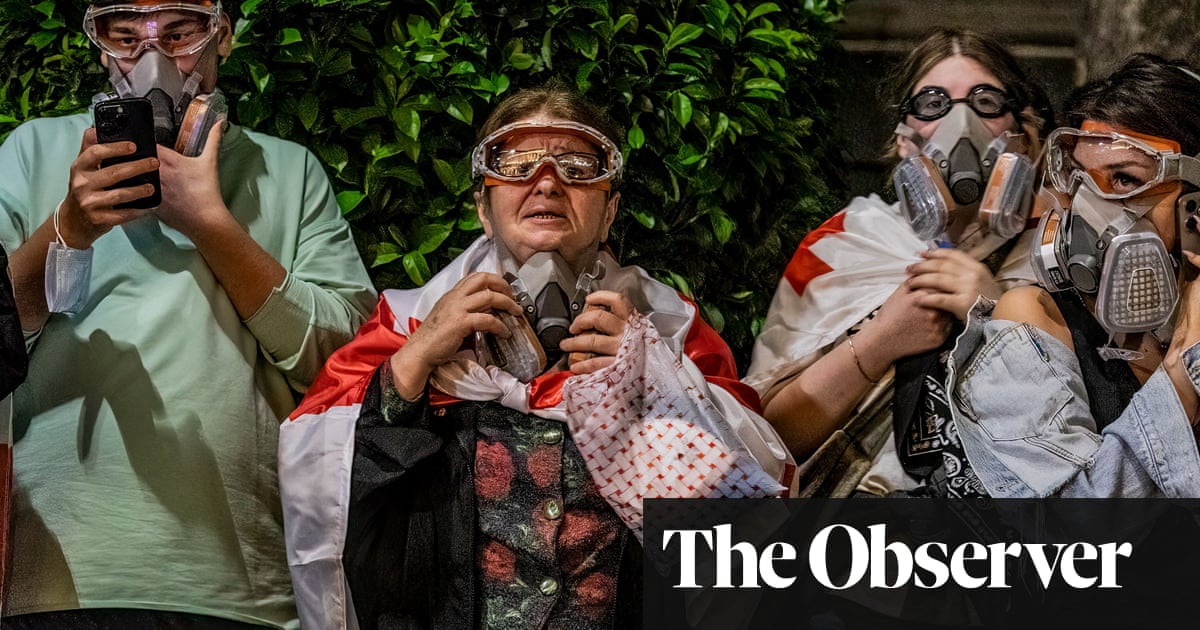[ad_1]
The finale of Beethoven’s “revolutionary” Fifth Symphony was met with thunderous applause at the National Theater of Opera and Ballet in Tbilisi last Thursday evening. The shouts grew into a powerful expression of solidarity with the protests outside on Rustaveli Avenue.
People hung EU flags from theater balconies and shouted: “No to Russian law! Europe! Georgia [Sa-kar-tve-lo]!”
They were reacting to the Georgian parliament’s decision the previous day to proceed with a second reading of a controversial bill that would oblige NGOs, civil rights groups and media organizations to register as “foreign agents” if more than 20% of their funding comes from within abroad. Protesters say the law is inspired by authoritarian Russian legislation and could be used to crush the opposition ahead of elections later this year. The ruling party, Georgian Dream (GD), says the “foreign influence” law is needed to “increase transparency”.
Thousands protested in Tbilisi in the last few days with dozens of arrests. I was on the street too. I am a Georgian journalist and I have spent my life resisting Soviet or Russian oppression. I believe that sovereignty, freedom and democracy are the most important values for my country.
I joined these protests when they started about three weeks ago, and I will be a part of them until the end. I don’t want to feel forced to leave my country because of this authoritarian legislation.
On Thursday, the Tbilisi Opera House was packed with the country’s intellectual and business elite. But the people protesting in the streets against the foreign influence law are mostly young. My daughter Anna, who is 23, joined me.
Since the first attempt to enforce the law last year, Gen Z has taken the initiative to oppose it. For more than a month, students and high school students marched energetically, sang, danced and expressed themselves freely and creatively. Far better informed, connected and digitally savvy than their elders, these young people have demonstrated incredible organizational skills.
Without formal leadership, these diverse groups of young people have formed broad and effective volunteer movements. They distribute water, food, emergency supplies and first aid. They also set up social media groups, run advisory campaigns on how to stay safe during police crackdowns, and help out-of-town protesters with travel and accommodation.
They do all this with ready hugs, smiles and offers of help. At first glance, it looks like a youth festival is taking place on the streets of Georgia. But every night their peaceful parties turn into an authoritarian nightmare of arrests and battles with government forces using tear gas and rubber bullets.
Civil society and free media provide checks and balances in the Georgian state system, and Western-funded institutions are effective tools against the consolidation of authoritarianism. Thanks to the media and NGOs, Georgian society is well aware of the dark sides of the ruling system – full-scale oligarchic capitalism, corruption and “state capture”.
Every day, high-ranking Western officials urge the ruling party not to resort to these heavy-handed mechanisms to control society and the media, not to endanger Georgia’s fragile democracy. The EU has warned the government that if it passes the foreign influence bill, Georgia’s EU accession talks will be at risk. John Kirby of the US National Security Council said the White House was “deeply concerned” by the bill because of “what it could do in terms of stifling dissent and free speech.”
GD officials continue to ignore these concerns. The protesters believe that the party is a puppet in the hands of its founder, oligarch and former prime minister Bidzina Ivanishvili.
Since Georgia gained independence, its ambitions for EU membership have grown steadily. Most citizens want their country to join the EU and NATO. For Georgia, turning its back on the West would mean a return to Russian domination. Russia can use its vastly greater military and economic potential against Georgia’s sovereignty and still effectively occupy 20% of our territory.
Civil society and independent journalism have died down in Russia since it introduced a “foreign agents” law in 2012. That’s why protesters are calling the Georgian bill “Russian.”
In the opera, the seats reserved for civil servants were empty. Many politicians are reluctant to appear in public as they are highly unpopular.
The spring of 2024 was marked by unprecedented discontent. Considering that our population is less than 4 million (a million Georgians have emigrated, mainly to Western countries), the sight of thousands of protesters on the streets of several cities should be alarming to the government.
But as long as he continues to pursue controversial laws, we will continue to put on our gas masks and goggles and stand with our family and friends for freedom and democracy.
[ad_2]
